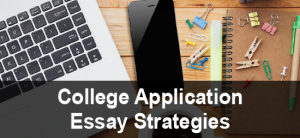

Dr. Jennifer B. Bernstein
- Success Stories
- One-Time Consultation
- All-In-One & Comprehensive Private Support
One of the Common Application essay prompts asks you to “reflect on a time when you questioned or challenged a belief or idea. What prompted your thinking? What was the outcome?”
- Why Colleges Want to Read Essays on Your Experience Questioning or Challenging a “Belief or Idea” (which also gives you important hints about the types of underlying things you want to reveal about yourself in your anecdotes)
- What Not to Do in an Essay on a “Time When You Questioned a Belief or Idea” (to help you avoid falling prey to a common mistake)
- Essay Example by Cornell Admit
2020 UPDATE & Why Most Students Don’t Write About a Time They “Questioned or Challenged a Belief or Idea”
Most students don’t write their Common App essays on challenging a belief or idea.
But you’re not aiming to be like most students, right?
Consider what the Common App team points out in their 2020-2021 update on the essay topics:
“While students aren’t inclined to discuss a time when they challenged a belief or idea, members appreciate what those essays reveal about the students who write them .”
[Just FYI: Members are the colleges that use the Common App.]
It’s interesting to get this feedback from the Common App because it aligns with the patterns I’ve observed with my own students.
Many of my students have immediately dismissed this essay topic, especially when it used to be phrased this way: “Reflect on a time when you challenged a belief or idea. What prompted you to act? Would you make the same decision again?”
They felt they couldn’t write a Common App essay on this topic because they. . .
- never questioned or challenged a major belief or idea
- challenged a belief or idea but that didn’t necessarily involve taking some big action
- didn’t want to “rock the boat” in their essay.
However, I want you to notice the BIG change in the Common App’s phrasing of the topic.
The emphasis is no longer just on challenging a belief or idea.
Now you’re also invited to consider writing about a time when you questioned a belief or idea and asked to shed more light on your thinking (rather than just your action).
There are so many interesting possibilities for the “questioned or challenged a belief or idea” essay topic, so I want you to keep an open mind and see if it could be a good fit for you.
Why Colleges Want to Read Essays on Your Experience Questioning or Challenging a “Belief or Idea”
Why do schools that use the Common App say that they “appreciate” what essays a “time you questioned or challenged a belief or idea” demonstrate “about the students who write them”?
Let’s consider some possibilities.
REASON #1: Colleges value students who are open to exploring and respecting perspectives other than their own. Sometimes this involves questioning or challenging your own beliefs or ideas and sometimes it involves challenging those of others.
A significant part of the intellectual and social experience of college involves opening yourself up to new perspectives and getting to know people from a wide range of backgrounds.
Some of the most interesting discussions and learning experiences occur when there’s a range of beliefs or interpretations shared during class discussions, while working on projects, or in student organizations.
Remember that this essay prompt is asking you about a “time when you questioned or challenged a belief or idea.”
That DOESN’T necessarily mean CHANGING them.
Questioning or challenging ideas or beliefs can also involve enlarging, developing, or refining them.
It could involve realizing that someone’s perspective (including your own) is limited and only applicable in certain circumstances.
REASON #2: Admissions officers are interested in your habits of mind, including your ability to engage in critical thinking.
Even if you’re writing about standing up against a significant injustice, you can’t just write an essay about squashing it.
You have to reveal how you grappled with the issues at hand and how best to address them.
Although the phrase “critical thinking” doesn’t appear in the wording of this Common App essay prompt, that’s one of the things admissions officers want to learn about when reading your essay.
The way you demonstrate your critical thinking in this essay is through your description of “what prompted your thinking.”
Let’s clarify what’s meant by critical thinking.
Wikipedia provides this definition of critical thinking . It involves:
“being inquisitive and curious,
being open-minded to different sides,
being able to think systematically,
being analytical, . . .and
being mature.”
In a previous version of this Wikipedia entry, I found this definition as well. Critical thinking. . .
“clarifies goals,
examines assumptions,
discerns hidden values,
evaluates evidence,
accomplishes actions, and
assesses conclusions.”
Someone who thinks critically doesn’t just take things at face value (even if they seem obviously wrong or bad).
They look beneath the surface to figure out the assumptions and values informing the information and situations they encounter. They also know how to evaluate evidence and consider what types of evidence are–and are not–being provided.
When you’re writing about “what prompted your thinking” in terms of challenging a particular belief or idea, you want to show evidence of these ways of thinking–of these ways of examining your beliefs and ideas and those of others. You definitely don’t have to demonstrate all of them.
REASON #3: The “challenged a belief or idea” essay is a great way to demonstrate your “intellectual vitality” that all colleges, not just Stanford, are looking for in applicants.
This reason combines the first two that we’ve covered but pushes them to the next level.
Let’s consider what the former director of Columbia University’s graduate nonfiction program has to say. In To Show and To Tell: The Craft of Literary Nonfiction , Phillip Lopate points out:
“In the best nonfiction,. . .you’re always made aware that you are being engaged with a supple mind at work . The story line or plot in nonfiction consists of the twists and turns of a thought process working itself out ” (6).
Many students just don’t yet realize that “ follow[ing] a live, candid mind thinking on the page ” is extremely interesting and important for admissions officers (43).
Just as importantly, most students don’t know how to make their thinking processes spring to life in their writing. It takes time and lots of guidance to master the art of writing this way.
However, it’s this kind of writing that demonstrates the “intellectual vitality” that admissions officers are hunting for when they read your application material.
Many times it’s not the surface level of your narrative (in this case, the specific belief or idea you questioned or challenged) that matters most to admissions officers. It’s your process of thinking and acting.
What Not to Do in an Essay on a “Time You Questioned a Belief or Idea”
One of my former students wanted to focus on a time when he stood up for a student at his school who was being bullied (which involved challenging one of the bully’s core beliefs)
That was actually a good initial idea.
Even though it might seem like a cliched approach to responding to the essay prompt, it’s in the details–in the vivid anecdotes and insights–that you can stand out and make the essay your own.
However, this student had two friends who were constantly ripping his draft to shreds.
“More DRAMA!!!!”
“Don’t tell, SHOW!!!”
Those are the kinds of notes I’d see in the margins of his draft.
His friends eventually convinced him to create an essay that was so exaggerated that it was unbelievable and stripped his writing of his deeper, more significant thoughts and feelings about the situation.
Yes, your essay needs internal and external tension or conflict, but it doesn’t have to be blown out of proportion.
Nuance and subtlety often have more power than you realize.
Yes, you need to show, but you also need to tell.
I strongly recommend checking out these two articles , which reveal effective strategies to use in your Common App essays.
“Techniques Used in the Best College Application Essays”
“Two Elements of the Best Common Application Essays”
“Challenged a Belief or Idea” Essay Example by Cornell Admit
Background Info: One of my students who was accepted to Cornell Engineering wrote about her experience challenging a Science Olympiad judge’s conclusion about the vehicle she created with her partner.
Click here to read my article on how to successfully position yourself for engineering programs.
You can watch the video or read about her essay down below.
ESSAY STRUCTURE, MOODS, AND TONES:
PARAGRAPH #1:
To generate immediate interest, she plunged readers right into the moment before the event, a great strategy for helping readers feel like they’re there with you.
NEXT FEW PARAGRAPHS:
Instead of jumping right into what happened during the event, she flashed back to the painstaking process she and her partner went through while preparing for the event.
She didn’t just tell admissions officers they’d spent all this time and energy on the project—she showed it through vivid, sometimes funny, examples about experimenting with various materials.
In this part of her essay, she was providing insight into her work ethic, attention to even the minutest details, ability to handle setbacks, and capacity to collaborate .
By this point, the student was in the middle of her essay, but the reader still didn’t know that she’s writing about a time she challenged someone’s idea or belief.
That’s totally fine!
You’re not writing an academic essay on challenging a belief or idea.
You’re immersing admissions officers in your world—taking them behind the scenes in your life—and, when the moment’s right, you can “tap” on the essay prompt.
SHIFTS IN MOOD AND TONE:
She started by creating an anticipatory mood , mixed the seriousness of preparation with a certain degree of humor , and then, after the flashback, gets to the serious part. She’s bringing readers back to the present moment to describe the engineering event itself and the judge’s decision. Because she so effectively described the process, readers feel the let down when something goes wrong.
Readers feel like they’re going on a journey.
That’s a good thing.
NEXT PARAGRAPHS:
The student then described how she and her partner were so taken aback by the results and how they tried to make sense of what happened.
Through these anecdotes she demonstrates her critical thinking skills . She didn’t just jump to the conclusion that the judge was wrong.
She described how, when she realized the problem was with a certain measurement, her partner didn’t want her to say anything about it. She feared speaking up against the authority figure and felt they might suffer some sort of other penalty.
However, even though my student felt kind of queasy about challenging the judge, she did it and the decision was changed in their favor.
She drew her essay to a close with some insights into how this process of learning to speak up for herself—something she hadn’t really done before—changed her life in other ways. It’s not like she’s now always challenging authority but she feels more confident.
Your Next Steps for Writing a Great Common App Essay
Click here to gain access to my complete set of articles on Common App essays and supplemental essays.
Blog post images in order of use: ©claireandy/unsplash.com
Give Yourself A Competitive Edge!
Benefit from my unique approach, insider’s perspective, & great results
Get FREE instant access to
"What Really Matters to College Admissions Officers (and Why): Surprising Facts About What You Need to Be Doing in 9th, 10th, 11th, & 12th Grade"

Browse Articles On...

- Resources ›
- For Students and Parents ›
- College Admissions ›
- Essay Samples & Tips ›
"Gym Class Hero" - a Common Application Essay Sample for Option #3
Read a Sample Common Application Essay on Challenging a Belief
- Essay Samples & Tips
- College Admissions Process
- College Profiles
- College Rankings
- Choosing A College
- Application Tips
- Testing Graphs
- College Financial Aid
- Advanced Placement
- Homework Help
- Private School
- College Life
- Graduate School
- Business School
- Distance Learning
- Ph.D., English, University of Pennsylvania
- M.A., English, University of Pennsylvania
- B.S., Materials Science & Engineering and Literature, MIT
Jennifer wrote the essay below in response to the 2020-21 Common Application essay option #3. The prompt reads, Reflect on a time when you questioned or challenged a belief or idea. What prompted your thinking? What was the outcome?
A Unique Approach to a Tired Essay Topic
Jennifer takes an overused and cliché topic for an admissions essay—athletic heroism—and turns it into something surprising, humble, and deeply personal.
Gym Class Hero
I’m not really an athlete. I’m all for a rousing game of badminton or tennis, and I enjoy cross-country skiing and hiking, but I enjoy these activities as recreation. I don’t find enjoyment in testing my physical limits to the point of pain. I’m not competitive by nature; I rarely challenge others, or find myself face-to-face with an opponent. Except, to my surprise, if that competitor, that challenger, is simply myself. “Ok, I need some folks to run a mile,” Mr. Fox, the PE Teacher, bellowed over the 40-odd preteens loitering around the playing fields behind Lafayette Middle School. We were working through a unit on track and field events. Up to this point, I had managed to avoid participation. “It’s four times around the track. Any takers?” A couple people raised their hands and began assembling at the make-shift starting line. “Well, let’s get a few more out there,” he continued. Looking over the rest of us, he made a quick assessment and called out, “Johnson. Patterson. VanHouten. And, uh, Baxter.” I froze. Were there any other Baxters in my class? No. Only me. And, to my dismay, I heard myself saying “Okay!” as I made my way to the track, my heart already pounding, my stomach in knots, with zero confidence in myself. I couldn’t do this.
Where did my doubt come from? No one ever said to me, “Oh, you can’t run a mile.” I don’t even remember any askance looks, any raised eyebrows implying I was out of my depth. Middle-schoolers can be a cruel bunch, but not that day. There was just that voice in my head, as clear as a bell: “You’ll never be able to run a mile. You can’t even climb stairs without getting winded. It’s going to hurt. You’ll probably pass out. You could never run a mile.” A whole mile? That voice was right. It was, in my mind, impossibly long. What was I going to do?
I ran a mile. There was nothing else to do; I didn’t have time to question it, or come up with an excuse. Sometimes challenging a belief is as easy as just doing something. It wasn’t a conscious “I’m going to challenge this doubt and insecurity I have.” I just started running. Four laps around the track—it took me thirteen minutes. Which, as I research it now, is not particularly impressive. But at the time, I was pretty proud. For someone who never ran, I was just happy I finished. I didn’t feel great; my legs were shaky and there was something rattling around in my chest, but I had proven myself wrong. I could run a mile. Of course, I ended up throwing up about five minutes later. Even if I had new-found confidence and a sense of accomplishment, my body wasn’t quite ready for it yet.
I’m sure there’s some lesson to be learned there—something about not pushing ourselves too far, too fast. About knowing and assessing our limitations. But that’s not the important moral of the story. I discovered I wasn’t always right. I learned that I was too critical of myself, too cruel, too unforgiving. Yes, I’m not going to the Olympics anytime soon. Yes, I’m not going to set any records for track. But—once I stopped telling myself no, and just got on with the task at hand, I surprised myself. And that’s something I’m carrying with me into my future: the ability to shut off those doubting voices, and sometimes just going for it. I may surprise myself by discovering I can do much more than I thought possible.
Critique of "Gym Class Hero"
In general, Jennifer has written a strong Common Application essay. Is there room for improvement? Of course—even the best essays can be made stronger with effort. Below you'll find a discussion of some of elements of Jennifer's essay that make it strong as well as some comments on areas that could use some revision.
Jennifer's Topic
As the tips and strategies for option #3 state, the vagueness of the terms "belief or idea" allow an applicant to steer his or her essay in a wide range of directions. When asked about "beliefs" or "ideas," most of us will immediately think in terms of politics, religion, philosophy, and ethics. Jennifer's essay is refreshing in that she explores none of those things. Instead, she zeros in on something both commonplace yet remarkably important—that nagging internal voice of self-doubt that nearly everyone has experienced at one time or another.
Far too many college applicants feel that they must write about something profound, some amazing accomplishment, or some experience that is truly unique. In fact, many applicants get overly stressed because they feel they have had unremarkable lives and have nothing worth narrating in their essays. Jennifer's essay is a beautiful example of the fallacy of these concerns. She writes about something millions of teens have experienced—that awkward feeling of inadequacy in gym class. But she succeeds in taking that common experience and turning it into an essay that lets us see her as a unique person.
In the end, her essay really isn't about running a 13-minute mile. Her essay is about looking inward, recognizing her sometimes paralyzing self-doubt, examining what it is that often holds her back, and ultimately growing in confidence and maturity. Those four laps around the track aren't the point. What stands out is that Jennifer has learned an important lesson: to succeed, one needs to first step up and try. The lesson she learned—to stop telling herself "no" and just get on with the task at hand—is one that the admissions committee will admire, for it is a key to college success.
Jennifer's Title, "Gym Class Hero"
When the admissions staff first read Jennifer's title, they are likely to have concerns. If you read the list of 10 bad essay topics , the "hero" essay is one of the topics applicants would be wise to avoid. As meaningful as that amazing touchdown or game-winning home run may have been to the applicant, the admissions folks are tired of reading essays about these moments of athletic heroism. The essays tend to all sound the same, too many applicants write that essay, and the essays are all too often more about gloating than self-analysis and introspection.
Thus, the title "Gym Class Hero" could immediately have the reader in the admissions office thinking, "This tired essay. Here we go again." But the reality of the essay turned out to be something quite different. We quickly learn that Jennifer is no athlete, and her essay is not about heroism in any typical sense of the word. On one level, the title is ironic. A 13-minute mile is certainly not athletic heroism. Or is it? The beauty of Jennifer's title is that she takes the overused word "hero" and recasts it so that it is something internal, a sense of personal accomplishment that few people outside of herself would see as heroic.
In short, there is a slight danger in Jennifer's title. It's quite possible she'll evoke an initial reaction from the admissions officers, and it may not be a wise strategy to have a title that is going to shut down her readers before they even begin the essay. On the flip side, the beauty of Jennifer's essay is the way that it redefines the concept of the "hero."
There are plenty of strategies for writing a good title , and Jennifer could certainly take a safer approach. At the same time, the play on that word "hero" is so central to the essay something important would be lost with a different title.
Common Application essays need to be between 250 and 650 words. You'll hear different opinions on length from different counselors, but there's no denying that much more can be accomplished in an engaging 600-word essay than a well written 300-word essay. The ideal college application length depends on the writer and the topic, but going too short is often a lost opportunity to highlight who you are beyond your grades and test scores.
Always keep in mind why the college wants an essay in the first place: the school has holistic admissions and wants to get to know you as an individual. The school will know you better if you say more. Jennifer's essay comes in at 606 words, and they are 606 good words. There's little deadwood, repetition, or other problems of style . She tells an engaging story without digression or unnecessary detail.
A Final Word
Jennifer is not going to win an athletic scholarship, and no college is going to recruit her for her 13-minute mile. Her essay is not without minor flaws (for example, she uses the word "enjoy" three times in the first three sentences). But anyone who reads her essay will admire both her writing ability and her ability to look inward, analyze, and grow from an awkward moment in gym class.
The big test of an admissions essay is whether or not it answers a couple key questions for the admissions folks: Does the essay help us know the applicant better? Does the applicant seem like someone who we want to invite to share our academic community, and is she likely to contribute to our community in meaningful ways? In Jennifer's case, the answer to these questions is "yes."
Jennifer's essay isn't typical of responses to option #3, and the reality is that she could have submitted this same essay under some of the other options. "Gym Class Hero" would work for option #2 on facing a challenge . It could also work for option #5 on an accomplishment that sparked personal growth . Be sure to look carefully at the tips and strategies for all seven of the Common Application essay options to figure out which would be the best match for your own essay. In the end, however, it wouldn't really matter if Jennifer submitted her essay under #2, #3, or #5. Each is appropriate, and the quality of the essay is what most matters.
- "Grandpa's Rubik's Cube"—Sample Common Application Essay, Option #4
- Model Essay on Identity
- Common Application Essay Option 2 Tips: Learning from Failure
- Common Application Essay, Option 1: Share Your Story
- Common Application Essay Option 3 Tips: Challenging a Belief
- 2020-21 Common Application Essay Option 4—Solving a Problem
- Tips for the Pre-2013 Personal Essay Options on the Common Application
- The Length Requirements for the Common Application Essay in 2020-21
- "Handiwork" - Sample Common Application Essay for Option #1
- A Sample Essay for Common Application Option #7: Topic of Your Choice
- Sample Common Application Essay for Option #5
- "My Dads" - Sample Common Application Essay for Option #1
- Tips for an Admissions Essay on an Influential Person
- How to Ace Your University of Wisconsin Personal Statements
- College Application Essay - The Job I Should Have Quit
- Tips for the 8 University of California Personal Insight Questions
Home — Essay Samples — Life — About Myself — Challenging a Life Belief/Idea
Challenging a Life Belief/idea
- Categories: About Myself Personal Beliefs
About this sample

Words: 406 |
Published: Jan 25, 2024
Words: 406 | Page: 1 | 3 min read

Cite this Essay
To export a reference to this article please select a referencing style below:
Let us write you an essay from scratch
- 450+ experts on 30 subjects ready to help
- Custom essay delivered in as few as 3 hours
Get high-quality help

Dr. Heisenberg
Verified writer
- Expert in: Life

+ 120 experts online
By clicking “Check Writers’ Offers”, you agree to our terms of service and privacy policy . We’ll occasionally send you promo and account related email
No need to pay just yet!
Related Essays
2 pages / 1069 words
2 pages / 732 words
1 pages / 504 words
4 pages / 1987 words
Remember! This is just a sample.
You can get your custom paper by one of our expert writers.
121 writers online

Still can’t find what you need?
Browse our vast selection of original essay samples, each expertly formatted and styled
Related Essays on About Myself
This is a short story about myself. My essay is particularly about me in third grade. In third grade, my family and I moved to Morgan, Utah. I had to go to a different school, where I knew nobody. I had to make new friends. I [...]
Writing an essay describing yourself is like gazing into a mirror, attempting to capture the complex facets that compose your identity. It is an introspective journey that transcends the surface, delving into the core of your [...]
As I sit down to write this essay on describing myself, I can't help but feel a bit apprehensive. After all, talking about oneself can be a daunting task. However, I'll do my best to paint a picture of who I am in the most [...]
Empathy, the ability to understand and share the feelings of another, is a trait that has shaped my life in countless ways. From personal relationships to professional endeavors, my empathetic self has guided me through the ups [...]
Self-motivation or inspiration is the thing that pushes us to accomplish our objectives, feel more satisfied and enhance the general quality of our lives. Self-motivation is a long way from being a basic point; there are [...]
I prefer to be true to myself, even at the endangerment of finding the ridicule of others, rather than to be false and finding my own detestation. Why should I worry about what others think of me? I don’t give a shit about how [...]
Related Topics
By clicking “Send”, you agree to our Terms of service and Privacy statement . We will occasionally send you account related emails.
Where do you want us to send this sample?
By clicking “Continue”, you agree to our terms of service and privacy policy.
Be careful. This essay is not unique
This essay was donated by a student and is likely to have been used and submitted before
Download this Sample
Free samples may contain mistakes and not unique parts
Sorry, we could not paraphrase this essay. Our professional writers can rewrite it and get you a unique paper.
Please check your inbox.
We can write you a custom essay that will follow your exact instructions and meet the deadlines. Let's fix your grades together!
Get Your Personalized Essay in 3 Hours or Less!
We use cookies to personalyze your web-site experience. By continuing we’ll assume you board with our cookie policy .
- Instructions Followed To The Letter
- Deadlines Met At Every Stage
- Unique And Plagiarism Free
College 101
Common app 3: challenging beliefs.
Reflect on a time when you questioned or challenged a belief or idea. What prompted your thinking? What was the outcome?
Introduction
My father's words stumbled through his mouth and past his lips like a stream of water sloshing over upturned, jagged rocks. I felt his discomfort in my bones. Our new neighbor's openly judgmental expression angered me and I felt myself turn red. Twenty years my father spent carefully learning a language that somehow still betrayed him. Twenty years, and my father was still an outsider.
Up until this moment, this first encounter with our neighbor, my relationship with my father had been a lot like his English: broken. It took me seventeen years to realize the linguistic persecution that my father had felt for twenty. Once I finally did, my self-identity completely changed.
My story is the same as most first generation Americans: my parents are from a completely different culture, and so I was raised multi-culturally. I didn't quite fit in with my classmates, but I couldn't really relate to my parents either. I was stuck in the middle between two entirely different worlds.
As a child, of course, I chose the one I was living in.
I would come home some days and ask my parents if they could stop packing me leftovers for my lunch and just buy me Lunchables instead. I wanted clothes from American Eagle instead of Ross and Wal-Mart. My parents' native tongue was slowly becoming my heritage language. In other words, my first language was becoming my second language.
One day in particular stands out in my memory. My father had just come home from work; he had just started his residency program. Dark circles and wrinkles surrounded his honey-brown eyes and made them seem passionless, lost, and sad.
I didn't notice at the time.
My aging father slumped down on the couch and sighed heavily. Still, despite his very apparent fatigue, he attempted to make conversation and asked how my day was in our native language. I was twelve—you know, the age where you start thinking you know better than your parents. Ignoring his question, I told him he should speak in English since we were in the U.S.
As I approached adolescence, the rift between my parents and me only got bigger. My life revolved around school and my social life. Once my friends got their driver's licenses, I was hardly ever home.
Earlier this year, since my dad's medical practice was expanding, we moved to a better part of town. It was beautiful, a huge upgrade. As he was telling us the news, my father, beaming with pride, explained to me in English how we could finally afford to get cable. I laughed weakly, knowing that instant streaming was more popular nowadays.
The first encounter with our new neighbor changed everything. His name was Bill and he was a retired banker. My father greeted him graciously, despite the fact that he was on our property uninvited. Upon hearing his accent, his demeanor changed. "So, how long have you been living in America?" he asked. My father paused, as if he knew where the conversation was headed. It was probably a conversation he had had many, many times before. "Twenty years," he responded, with his head down.
That's when I realized how wrong I'd been. I regret staying silent during our encounter with Bill, but after that moment, I never spoke English with my parents again. I stopped scoffing at the cultural traditions they practiced every year. And whenever Bill came over unexpectedly, I made sure I was the one to talk to him.
I figured that at the very least, my parents should feel at home in their own home.
Seventeen years I wasted being ashamed of my background, my heritage, my family. I'm eighteen now, but I still cringe when I think about the self-absorbed person I once was. I still feel the shame and guilt of having realized something I should have known a long time ago: my parents aren't the ones who are broken.
Why This Essay Works
This essay knowingly discusses an issue that's present in many multicultural families: the culture clash between a first generation American child and their immigrant parents. The introduction eloquently unfolds the situation that acted as the catalyst for the author's change.
The body paragraphs give us more background about the author's family dynamic. The small anecdotes provided are examples of the author's cultural assimilation. We see a vulnerable, human side as they admit to things they're not proud of.
Let's be real—admissions officers probably get really tired of reading show-off essays that discuss how perfect everyone is. Come on, Shmoopers. We all know that's baloney. Not everyone did something when they saw someone getting bullied. Not everyone's a civil rights activist. Not everyone decided to volunteer at a homeless shelter or retirement home just out of the goodness of their hearts—although, those people are awesome.
Admissions officers want to know about growth, maturity, self-awareness; applicants should show that they can own up their mistakes and try to make them better. To get admitted into college, you have to be real.
In this essay, we finally see the change we wanted to see at the beginning. The author is ashamed, sure, but they resolve to become a more culturally aware person. Someone who would be a great addition to any college campus. Someone who would probably do great things in the future.
We'd like to get to know this Shmooper.
Tired of ads?
Logging out…, logging out....
You've been inactive for a while, logging you out in a few seconds...
W hy's T his F unny?

College Essay Examples: Challenging a Belief or Idea (with Humility)
In this essay, a student we're referring to as The Graduation Speaker, answers Common Application prompt #3. ("Reflect on a time when you questioned or challenged a belief or idea. What prompted your thinking? What was the outcome?") His essay is a fantastic example of how to approach this prompt with humility, wit, and likability. He submitted this essay as his personal statement and received acceptance to Stanford, Yale, Dartmouth, Duke, and UCLA.
- College Essay Examples
Is your College Essay Cliché?
Applicants often choose to write about cliché subjects because they THINK the resulting essays present the kinds stories admissions officers want to read. To the contrary, jumping on an essay cliché bandwagon can make it nearly impossible for an admissions officer to distinguish you from your closest competition. In this video, CEA's Founder and Chief Advisor presents The Cliché Quiz.

Successful College Essay Examples: The Nature Painter
Many students find it helpful to familiarize themselves with successful college essays to better understand what it looks like (or sounds like) when it's done right. There are so many different ways to write a great college essay, so don't feel confined to any formula, structure, approach, or tone. In this essay, our student showcases his love of science and nature by explaining the importance of having the right tools, both as humans and in nature at large. He gained acceptance to Yale University, Stanford, Harvard.

College Essay Examples: How to Write About Another Person While Still Making the Essay About You
So you want to write your college essay about a person who is very important to you and has shaped the person you've become today, but you are nervous that the essay won't say enough about you as the applicant (after all, your grandma isn't applying to college, you are!). We totally get it. Tons of students run into this issue. That's why we're sharing one of our favorite essays, written by a student we're referring to as "What Makes a Woman." This student masters the art of writing about another person's struggles, while reflecting on her own obstacles, perceptions, and identity.

College Essay Examples: Pulling Your Reader in From the Start
So you're reading successful college essays and they sound awesome...but what's the use of a great essay if you don't understand which defining features make the essay sparkle? In this video, we will be exploring TWO successful college essay examples, both of which are great examples of how to pull a reader into your story using visuals, intrigue/suspense, and maybe a little bit of humor.

College Essay Examples: How to Incorporate Dialogue into Your Essay
One way to pull a reader into your essay from the very beginning is to start with dialogue. Many students don’t even consider adding an outdated adage from a parent or a hilarious crack from a high school coach to break up their prose, set the scene or build the profiles of their stories’ characters. And yet, dialogue is one of those devices that can give you a lot of bang for your buck, delivering a punch of personality or a wallop of context using just a few carefully culled utterances. Here is one successful example of how a student uses dialogue to immerse her reader in her essay. We call this applicant, "In The Car with Mom."

College Essay Examples: Writing About a Background, Identity, or Interest
Many students choose to respond to the Common Application's first prompt (listed below) for their personal statement. This student (who we're referring to as The Nike Jordans), is one of them. In her essay, she writes about her background in a way that invites the reader to step into her shoes in order to learn more about her character, outlook, and personality. She gained acceptance to Princeton, MIT, U Chicago, and Columbia, among others.

In this essay, a student we're referring to as The Graduation Speaker, answers Common Application prompt #3. ("Reflect on a time when you questioned or challenged a belief or idea. What prompted your thinking? What was the outcome?") His essay is a fantastic example of how to approach this prompt with humility, wit, and likability. He submitted this essay as his personal statement and received acceptance to Stanford, Yale, Dartmouth, Duke, and UCLA.
- Our Approach & Team
- Undergraduate Testimonials
- Postgraduate Testimonials
- Where Our Students Get In
- CEA Gives Back
- Undergraduate Admissions
- Graduate Admissions
- Private School Admissions
- International Student Admissions
- Common App Essay Guide
- Supplemental Essay Guide
- UC Essay Guide
- Coalition App Guide
- The CEA Podcast
- YouTube Tutorials
- Admissions Stats
- Notification Trackers
- Deadline Databases
- Academy and Worksheets
- Deferral Guides
- Get Started

IMAGES
VIDEO
COMMENTS
Step one in tackling this prompt is coming up with an "idea or belief" you have questioned or challenged that will lead to a good essay. Keep in mind that the belief could be your own, your family's, a peer's, a peer group's, or a larger social or cultural group's. As you narrow down your options, don't lose sight of the …
You’re not writing an academic essay on challenging a belief or idea. You’re immersing admissions officers in your world—taking them behind the scenes in your life—and, when the moment’s right, you can “tap” on the essay prompt.
Tackling the Common App essay prompt about a time you challenged a belief or idea? Find advice on writing your response here.
In challenging a long-held belief about success, I embarked on a journey of self-discovery that transformed my life. I learned that success is a deeply personal and subjective …
Jennifer wrote the essay below in response to the 2020-21 Common Application essay option #3. The prompt reads, Reflect on a time when you questioned or challenged a belief or idea.
Challenging a Life Belief/idea. Growing up as the fourth child in a poor family, my life wasn't something anyone would wish for, especially at a young age. My parents never got …
Reflect on a time when you questioned or challenged a belief or idea. What prompted your thinking? What was the outcome? The Essay Introduction. My father's words stumbled through …
So you're reading successful college essays and they sound awesome...but what's the use of a great essay if you don't understand which defining features make the essay sparkle? In this …
Colleges often ask students to write an essay on overcoming a challenge. Here's how to write a thoughtful, engaging response to this topic.